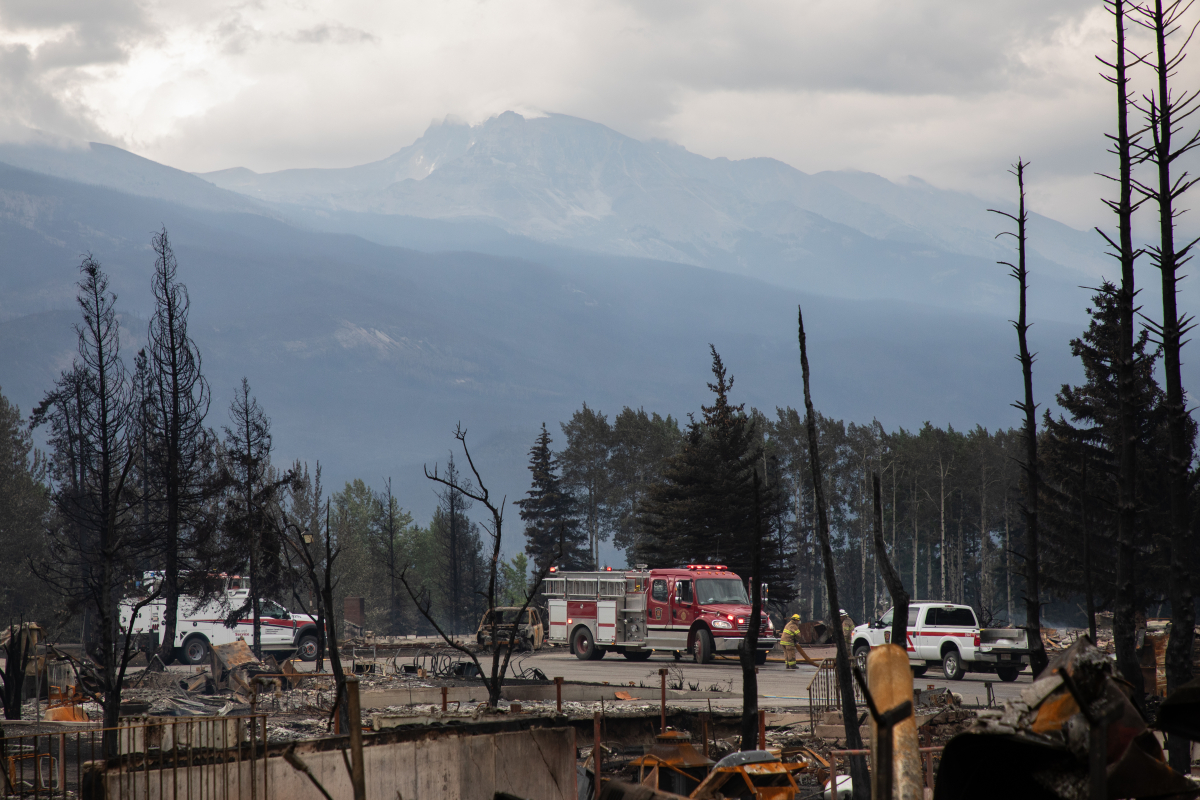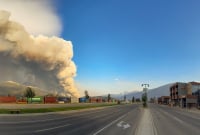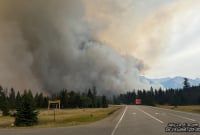Support strong Canadian climate journalism for 2025
Parks Canada officials and politicians angrily denied Monday that forest management policies in Jasper National Park contributed to a catastrophic wildfire that damaged one-third of the townsite.
Ron Hallman, CEO of the federal agency, said it was "ridiculous" to assert his organization puts a higher value on nature than people.
"That is offensive, frankly," he said. "There is nothing that is more important to Parks Canada than the safety of our employees, our guests and the people that we work with."
Although fire officials said Monday that fires within the Jasper townsite have been extinguished and progress against the fire is being made, flames in the Rocky Mountain park 360 kilometres west of Edmonton continue to burn.
More than 20,000 people in and around the community were ordered to evacuate last Monday because of the speed of the fires and more that 30 per cent of town's buildings have been destroyed.
Federal Environment Minister Steven Guilbeault said a staged re-entry plan for those residents is being developed, although he did not give a timeline. The highway through the park remains closed.
Critics have suggested more could have been done to reduce the fire hazard in the area. Some say prescribed burns should have been used to thin out forests thick with highly flammable dead trees, especially those killed by mountain pine beetle infestation.
Hallman said Parks Canada has been using prescribed burns in Jasper since 1996. He said in the last decade, Jasper has had 15 prescribed burns that have covered thousands of hectares.
"We do everything we can reasonably do to remove underbrush, to do prescribed burns, to reduce risks to assets, to towns, to people."
Jasper Mayor Richard Ireland defended Parks Canada, saying the impact of mountain pine beetle was so widespread in the park that removing all the dead trees would have been impossible.
"We're talking about a valley that is kilometres wide and 30 kilometres long and it is absolutely full of pine-beetle-dead trees. There is no way to remove all of them."
He called the response to the Jasper wildfire a success. He said the town and Parks Canada were aware of the risk and took steps to prepare the town against them, such as becoming one of Canada's first FireSmart communities.
"We anticipated that something like this could happen so we fortified our community," he said.
"When the attack came, those defences worked. We suffered casualties but we did hold our ground."
Steve Carr, executive director with the Alberta Emergency Management Agency, said exercises were done six weeks ago in anticipation of such an event.
"I would suggest that they were very well prepared and very well integrated and worked very well to face this emergency, the scope of which it is hard to imagine in advance and very hard to prepare for such a dramatic situation," he said.
"They were a well-prepared community by all accounts."
Guilbeault also stood up for Parks Canada, pointing out 70 per cent of the historic town was saved.
"Years of preparation, forest management, simulated evacuations and firefighting efforts paid off," he said.
Parks Canada has said information on what has been damaged outside the town is being collected. Firefighters are working to protect homes and other accommodations in those outlying areas.
Jasper National Park remains closed and RCMP are ensuring the town is secure, Parks Canada said, noting there are checkpoints to keep people out.
A Parks Canada official said Saturday the fire could burn for months.
Evacuees from Jasper learned Sunday the Alberta and federal governments will provide additional money for relief, with both saying they'll match donations to the Canadian Red Cross 2024 Alberta Wildfires Appeal.
Federal Emergency Preparedness Minister Harjit Sajjan and Mike Ellis, Alberta's minister of public safety and emergency services, said in a joint news release that the donation-matching initiative means every $1 donated will become $3 to support people most affected by wildfires in Jasper and across the province.
Extra help to fight the fires in Jasper and other parts of Alberta has also been arriving. The Canadian military tweeted photos Sunday of soldiers in Hinton, where it said they were undergoing "firefighter refresher training" led by the local fire department.
Forty Quebec forest firefighters flew to Edmonton on Sunday ahead of a two-week mission in the field. Support from Ontario, Mexico, Alaska, Australia and South Africa -- which sent 200 firefighters -- has also arrived.
Elsewhere in Alberta, the province said Sunday that rain helped firefighters extinguish nearly 50 wildfires in the previous 48 hours, and another 17 wildfires were no longer out of control.
This report by The Canadian Press was first published July 29, 2024.
This is a corrected story. A previous version misattributed a quote from Steven Carr.






Comments
Flapping tongued critics and misinformation peddlers are having fun? spreading bile and taking pot shots at firefighters and bureaucrats Pot shots at climate denying politicians I can tolerate.
The reality is that once these fires get going with a wind behind them and catastrophically dry conditions on the ground - there is precious little puny fire crews can do to stop, let alone slow down or re-direct them. Those who have sat at home comfortably watching wildfires on the telly should keep their traps shut. (Which includes me) I have a powerful imagination but I'm not so stupid that I don't know fires like these are beyond the human imagination.
If you have to slag someone try Alberta's government (politicians) to start with. De-funding firefighting, de-funding forest management....